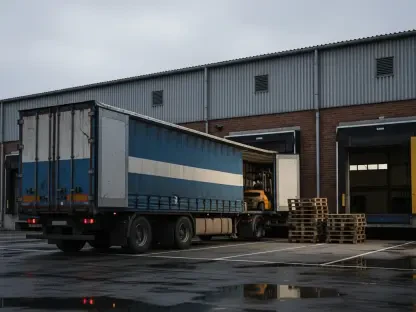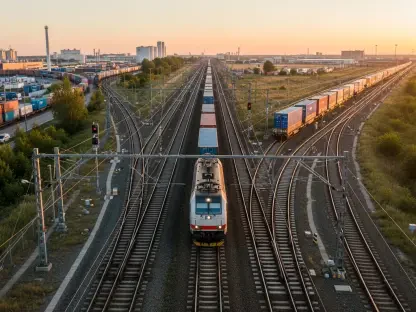Canada’s federal government has swiftly intervened to resolve an industrial dispute that had paralyzed the operations of two of the nation’s largest railway companies, Canadian National Railway (CN) and Canadian Pacific Kansas City (CPKC). The disruption posed a significant threat to supply chains across North America. Labor Minister Steve McKinnon announced that railway operations should resume “within days,” as binding arbitration was initiated to resolve the conflict between the rail companies and the Teamsters union, who represent nearly 9,300 workers locked out after failed contract negotiations.
Escalation of the Rail Dispute
Deadlock in Negotiations
The root of the crisis lies in the expiration of labor agreements for both railways at the end of the previous year. Despite months of negotiations, the talks had reached a deadlock by Wednesday evening, with both parties blaming each other for the impasse. The Teamsters accused the rail companies of neglecting worker safety, particularly the need for adequate rest for train operators handling hazardous materials. Safety concerns were heightened by the potential dangers involved in transporting these materials, making adequate rest non-negotiable for Teamsters. Conversely, CN and CPKC argued that binding arbitration was necessary to resolve the deadlock and had been advocating for it from the start. Both sides were entrenched in their positions, leaving little room for compromise.
Government Intervention
Recognizing the critical importance of maintaining the flow of goods, the Canadian government leveraged its authority under the Labour Code. This step was aimed not only at resuming rail operations but also at preserving industrial peace within this vital sector. McKinnon emphasized the government’s commitment to collective bargaining, while also acknowledging the essential nature of railway services to the national and global economy. The government’s intervention came at a crucial time, as prolonged disruptions could have resulted in dire economic consequences. By mandating arbitration as a solution, the government sought to strike a balance between the rights of the workers and the necessity of uninterrupted railway operations.
Impact of Disrupted Railway Operations
Economic Ramifications
Canada relies heavily on its railways, with roughly 75% of its exports to the US being transported by rail. The halted operations jeopardized the movement of essential goods including grains, beans, potash, coal, and timber. The potential economic ramifications were enormous, with supply chain disruptions and estimated losses running into hundreds of millions of dollars. Among the most affected were sectors reliant on just-in-time deliveries, where even a minor delay could cascade into significant economic losses. The agricultural industry faced the immediate threat of produce spoiling, while manufacturing sectors risked halting production lines due to the unavailability of essential raw materials. The urgency for a resolution underscored the necessity for prompt governmental intervention.
Interconnected North American Supply Chains
The US, being the primary recipient of Canadian exports, closely followed the developments. Acting US Secretary of Labor Julie Su had already been in communication with Canadian Labour Minister Steve McKinnon, emphasizing the interconnected economic implications for both countries. The supply chain disruptions extended beyond national borders, affecting numerous sectors reliant on the seamless movement of goods. Automakers, chemical companies, and construction industries felt the pressure as critical inputs threatened to halt production lines. The economic ramifications were not limited to immediate losses; the potential for long-term impacts, such as renegotiation of supply contracts and increased operational costs, loomed large. Timely intervention by both governments was critical in mitigating these risks and ensuring a swift return to normalcy.
Arbitration as a Solution
Role of the Canada Industrial Relations Board
The arbitration solution involves the Canada Industrial Relations Board (CIRB), which will resolve disputes over new collective agreements. Until the arbitration concludes, the board has extended the terms of the existing agreements to allow workers to return to their duties as swiftly as possible. This move is pivotal in maintaining operational stability while giving both parties the opportunity to present their cases without the immediate pressure of halted operations. The CIRB’s decision to extend existing agreements ensures that laborers can resume work under known conditions, eliminating additional stress or confusion during the transition phase. Both railway companies expressed satisfaction with the government’s move, seeing it as a necessary step to safeguard national interests while the arbitration process unfolds.
Responses from Stakeholders
CN stated its disappointment at the failure to achieve a negotiated agreement but welcomed the arbitration process as a fair and objective solution to the deadlock. Similarly, CPKC’s CEO Keith Creel remarked that the government’s intervention was necessary to protect national interests and, despite fundamental belief in the collective bargaining process, saw the arbitration as a pragmatic compromise. From the perspective of the Teamsters union, led by National President François Laporte, the primary sticking point throughout the negotiations was safety. Laporte underscored that rail operations often involve transporting materials that are potentially dangerous, and worker fatigue due to inadequate rest could compromise safety. The union’s stance is that personnel operating these trains must be rested and alert to perform their duties safely, without the risk of accidents attributable to fatigue.
Broader Implications and Future Outlook
Industrial and Economic Dependencies
The sudden halt in railway operations revealed the dependency of various sectors on reliable rail transport, from agriculture to industries reliant on raw materials like coal and timber. Swiftly reopening the railways is expected to mitigate some of the immediate economic impacts, although the longer-term effects will depend on the outcome of the arbitration and future negotiations between the labor union and railway companies. For instance, if the arbitration leads to more stringent safety protocols, it could set a new standard within the industry, potentially increasing operational costs but improving overall safety. The situation serves as a stark reminder of the delicate balance between labor rights and industrial productivity, highlighting the need for robust mechanisms to resolve such disputes swiftly.
Balancing Labor Rights and Economic Imperatives
Canada’s federal government has taken decisive action to address an industrial dispute that had brought the operations of two of the country’s largest railways, Canadian National Railway (CN) and Canadian Pacific Kansas City (CPKC), to a standstill. This disruption significantly endangered the integrity of supply chains across North America, causing widespread concern among industries dependent on timely rail transport. Labor Minister Steve McKinnon stated that railway services are expected to resume “within days,” as binding arbitration is set into motion to settle the conflict between the rail companies and the Teamsters union. The union represents nearly 9,300 workers who were locked out following unsuccessful contract negotiations. The government’s swift intervention aims to stabilize the rail sector, ensuring that essential goods continue to flow smoothly and that the economic impact of halted operations is minimized. This action highlights the critical role of government in mediating significant labor disputes that have broad economic consequences.









